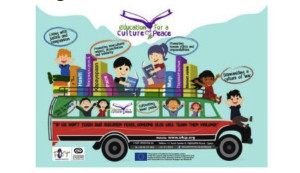February 2, 2016, published in CPNN
The need to have an educational system which promotes peace and reconciliation rather than perpertuating violence ans war is the focus of a programme entitled “Education for a Culture of Peace”.
In a joint interview with the CNA, Greek Cypriot and Turkish Cypriot participants to the programme Loizos Loukaides and Süleyman Gelener point out that, at a time when efforts to reach a solution of the Cyprus problem are intensified, the need for change in the educational system in order to cultivate a culture of peace and anti-racism is imperative.

A total of 180 teachers have been trained from both communities as part of the programme and a number of workshops on education for peace and democratic structured dialogue have also taken place.
In the first semester of 2016 joint activities for 160 students from both communities are planned to take place.
The two educators express their conviction that the programme can be described as a success.
Loukaides said that the programme is funded by the EU and was created by a group of people who either take part in AHDR or at the Research Institute POST, either in their personal capacity as scientists, researchers or active citizens.
“The programme was created because of the need to have an educational system which will not perpetuate violence and war but instead it will promote peace and reconciliation, not only as regards relations between the two communities but on a more comprehensive framework which includes other themes of what we call `Peace Culture`”, he says.
The idea for such a programme is not something new, Gelener says on his part. In previous years, he adds, “we had to face some problems as regards its implementation and to the way teachers would come in contact with the programme.”
“Later on, when EU grants for Turkish Cypriots were announced we thought this programme could fall within their remit and after jointly applying for the grant, we got it,” he adds.
According to Loukaides a library has been created at the premises of the Research Institute POST which includes approximately 600 books related to education for peace. It ranges from children`s literature to research books and text books with exercises for education and peace.
With the help of the Ministry of Education and Culture and Turkish Cypriot teachers` trade unions the programme has had access to teachers and has organised workshops across the divide in the capital Nicosia, as well as in Paphos and Larnaca, he points out.
The next workshops took shape out of the views expressed in the first series of workshops, he explains. An introductory workshop took place before the summer and this year, two weeks ago, all teachers from both communities of Cyprus came together in a bicommunal workshop.
For the time being seminars with teachers will continue. Another two meetings will take place with teachers from both communities while during the first six months of the year activities with 160 students from across the island will start.
A theatre summer camp under the title “Crossroads” will also take place in cooperation with the theatrical organisation TheatrEtc experienced in hosting such camps for teenagers.
Next year an international conference on education for a culture of peace is planned, in which teachers and experts from abroad will take part.
The programme will conclude with a topic on the work achieved during its three years of operation which will also include ideas for new actions for both Cyprus and abroad, because, as Loukaides says, “we believe our work is innovative not only for Cyprus but also for other countries which suffer from conflict.”
Referring to the programme`s goals Süleyman Gelener highlights the fact that it does not just focus on Cyprus or on the process between the two communities but also on a wide variety of issues such as human rights, animal rights, environmental protection, organic nutrition and generally issues that matter.
“I feel that if we manage to create a society which is aware on these issues and grows up in such a culture, then the Cyprus problem will be resolved more easily,” he says.
Read the original article here.

Leave A Comment
You must be logged in to post a comment.